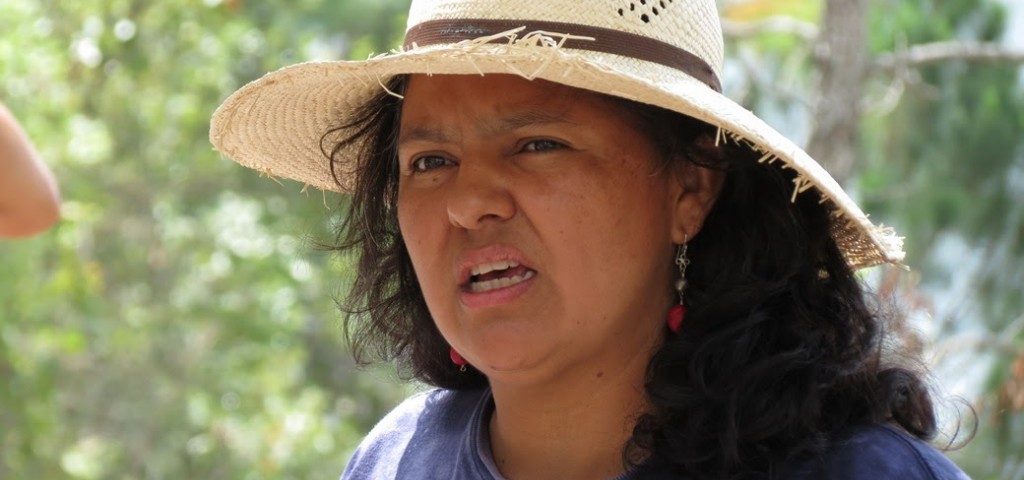
Ten reasons to take your backpack and go!
31 October 2020
Walkscaping, a new travel perspective for Liguria
15 December 2020Killed for defending her land, her people.
Killed to hide the truth.
This is the story of Berta Cáceres, an indigenous activist belonging to the Lenca, a population living in the southwestern part of Honduras and living in a condition of poverty and political and cultural oppression. She was still a student when in 1993 she founded COPINH (Consejo Cívico de Organizaciones Populares e Indígenas de Honduras). It is an indigenous and social organization aimed at promoting the improvement of the living conditions of the Lenca and Honduras indigenous communities. The will is to fight for the recognition of the political, social, cultural and economic rights of these peoples.
The protests
Berta’s protests and campaigns to safeguard the Lenca culture and the natural environment in which the people live are recognized worldwide. In 2015, she was awarded the Goldman Environmental Prize, the highest award for activists who fight for environmental causes. Berta wanted to guarantee respect for her people and her land, often victims of speculation by the government and multinationals which, through projects and construction in the Honduran territory, have put the lives of the population at risk.
The target
The battles that cost her her life were directed against one of these projects: the project to build a series of hydroelectric dams on the Gualcaraque River starting in 2010. The Agua Zarca hydroelectric complex, promoted by the Honduran company Desarrollos Energéticos SA (DESA), created in 2008 solely for the project, involved the construction of dams on the Gualcarque river allowing de facto the privatization of the waterway and surrounding natural resources. Numerous international lenders took part in the project: the largest Chinese state-owned Sinohydro dam developer, the World Bank’s International Finance Corporation, the Dutch development bank FMO and Finnfund, Finnish for industrial cooperation.
From the very beginning, the builders of the dam violated international and local laws regarding the rights of indigenous peoples by not consulting the local population about the project. The river was and is considered by the indigenous people as a sacred place where the guardian spirits of the people reside. It is Berta herself who emphasizes this at the award ceremony for the Goldman Environmental Prize in San Francisco, recalling that in the Lenca cosmos-vision the man is a being born of the Earth, water and corn and that the Lenca people are the ancestral guardian of rivers.
But not only
Rio Gualcaraque, as well as being sacred, is vital for the sustenance of more than six hundred families who live in the areas adjacent to the river, a resource that represents the main source of water, food and medicine.
The construction therefore represented a danger to the survival of the community and it is for this reason that Berta fought in the course of her life. Together with the local inhabitants he organized protests, meetings and legal actions which led, in 2013, to partial success.
The International Finance Corporation and the Sinohydro company in fact withdrew from the project. DESA, on the other hand, continued its plan, but moved the dam construction project to the opposite side of the river. A partial victory therefore for the Lenca family, which led Berta to come under the crosshairs of those who supported the project. In the first place there was the local government: thus began threats and intimidation. These also came from the same police who had the task of protecting her, since Berta was on the list of people in danger of life in Honduras.
Despite everything, nothing seemed to stop Berta
That courage and determination of this woman willing to risk her life to protect her land can be seen in the last words of her speech in San Francisco. In it he reaffirms the need to build societies capable of coexisting in a just and dignified way for life, while respecting the environment that surrounds us. He dedicated the prize received to all the rebels, the Lenca people and all the martyrs who gave their lives for the good of nature.
The more the Honduran activist urged his people not to yield, the more frequent the death threats became, culminating in a tragic epilogue. On the night between 2 and 3 March 2016, armed men (sent by DESA) broke into her home in La Esperanza, Honduras, assassinating Berta.
The Dutch development bank FMO and FinnFund have since suspended their involvement in the Agua Zarca project, officially terminating any existing contractual relationship. It happened on 6 July 2017. It stated that “The exit of the financiers from the project is intended to reduce international tensions and premises in the area “. He also added “it is important that a credible international human rights institution can monitor the situation on the ground”.
Berta’s battle was won, but at too high a price
Francesca Piano

